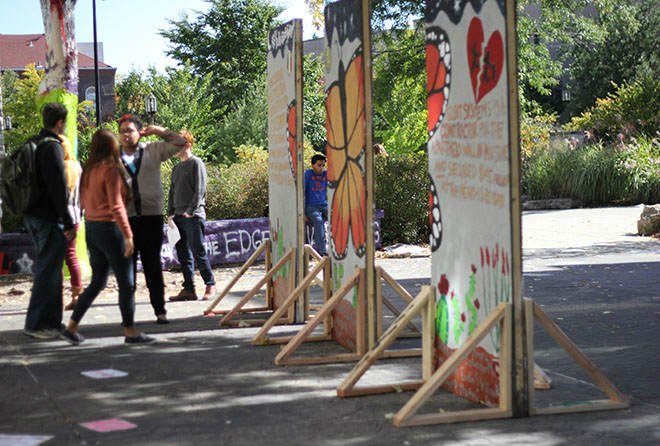
The wall was comprised of three double-sided panels. One side of the wall was painted with a map of Palestine over time and text regarding Israel’s “systematic repression,” while the other side depicted a giant butterfly and a couple of lines about how contractor Elbit Systems funded both the Israeli and U.S. border barricades. Furthermore, the illustrations asserted that the Israeli wall is “in violation of international law” and a “crime against humanity.”
An op-ed letter that appeared in the Daily Northwestern last Wednesday stated that the wall is SJP’s and M.E.Ch.A.’s “rejection of the colonial policies of the U.S. in the borderlands and of the Israeli forces in Palestine.” Weinberg junior Cinthya Rodriguez, speaking on behalf of M.E.Ch.A. and SJP, explained that the main goal of the wall was to raise awareness about the deaths of Palestinians in Gaza and of people near the U.S. border.
“The situation [near the border with Mexico] is really dire right now,” she said. “Nobody’s really talking about all the people that die in the desert in the summer and all throughout the year.”
Rodriguez also said United States security measures such as Operation Gatekeeper and Operation Hold the Line negatively affected the lives of many people while trying to curb undocumented immigration. She said that M.E.Ch.A. decided to partner with SJP because of the similarities between the two conflicts, specifically how Elbit Systems received funding from both the U.S. and Israeli governments to build the barriers.
The protest drew the ire of the pro-Israel advocacy group Wildcats for Israel (WI).
“Every wall and panel was factually incorrect and historically inaccurate,” said WI president and Weinberg junior Jonathan Kamel. “[SJP] has the freedom of speech to present what they want, but people have to know that they spread lies and inaccurate information to students who are uninformed about the issue.”
Kamel added that WI was not planning a protest in response to the wall, saying that “any type of reaction would give [SJP] more attention.” However, he said that some kind of response is in the works in conjunction with other pro-Israel groups, such as Northwestern Hillel.
J Street U, an advocacy group whose message is “Pro-Israel, Pro-Palestine, Pro-Democracy,” didn't like the message that the wall was trying to send either.
“At J Street U, we stand strongly against the Israeli occupation of the West Bank,” J Street co-chair and Weinberg senior Joshua Boxerman said. “We believe that it needs to end, that it needs to end soon, and in the context of a two-state solution. And SJP calling attention to the occupation is important … However, SJP’s action needs to be contextualized.”
Boxerman went on to say that “the barrier itself did not come out of nowhere, but out of a very specific political context. Israel had legitimate security concerns that it sought to address by building the barrier.” Boxerman also presented the other side of the conflict.
“It’s true that the way the barrier has actually impacted life has been incredibly detrimental for an incredible number of Palestinians,” he said. But Boxerman also took issue that the protest was held with the support of M.E.Ch.A., specifically because of the political context.
“We felt that they were conflating two issues that are each important in their own right, but are their own individual issues,” he said. “While it’s true that the same company is responsible for the building of both the U.S.-Mexico border wall and the Israel-Palestine separation barrier, that is where the similarities end. To equate and conflate those situations is not intellectually honest.”
Both Wildcats for Israel and J Street U participated in a joint op-ed in the Daily with other pro-Israel groups that was published earlier today.
Editor's Note: This story has been updated from its original form to reflect that M.E.Ch.A. partnered with Students for Justice in Palestine to construct the wall, and fixes a factual error found in the original inclusion of a statement from Rodriguez regarding the people being harmed by U.S.'s border relations with Mexico. North by Northwestern regrets these errors.